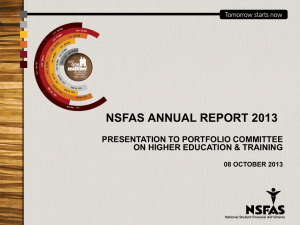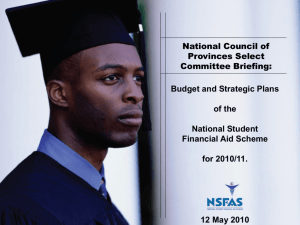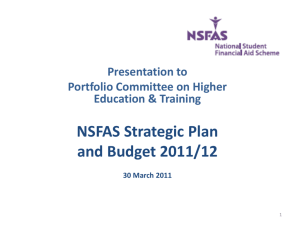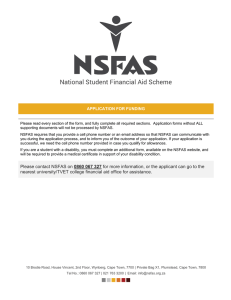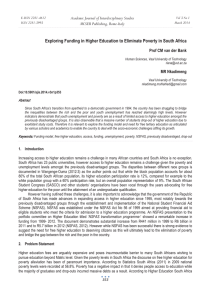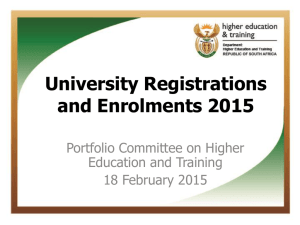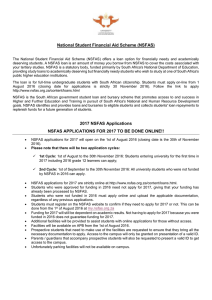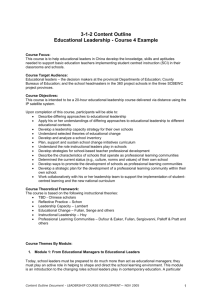National Student Financial Aid Scheme
advertisement
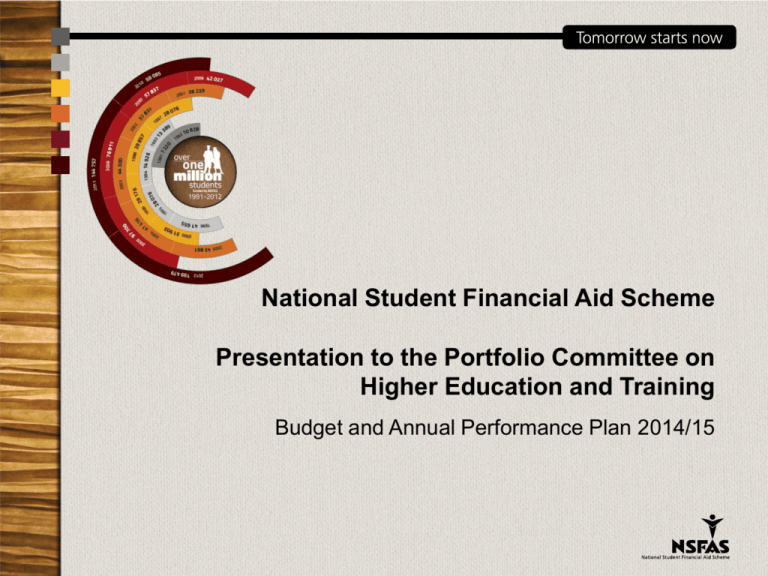
National Student Financial Aid Scheme Presentation to the Portfolio Committee on Higher Education and Training Budget and Annual Performance Plan 2014/15 Presentation Overview 1. Introduction • • • • 2. NSFAS mandate and background Vision, mission, values, partners Strategic focus Student-centred model Annual Performance Plan and Budget 2014/2015 • • • • Strategic goal and plan Overview of Programmes Programme strategic objectives, performance indicators, targets and associated budget Budget 2 About NSFAS NSFAS is a public entity reporting to the Department of Higher Education and Training, governed by the NSFAS Act (56 of 1999) • Since inception in 1991, NSFAS has disbursed more than R 41,5 billion in loans and bursaries to 1,4 million students • In 2013, NSFAS disbursed R8,7 billion to 416 000 students at the 23 public universities and 50 public Technical and Vocational Education and Training (TVET) colleges throughout the country – In 2012 , NSFAS disbursed R7,7bn to 383 000 students 3 NSFAS Mandate • • • • • • • to develop criteria and conditions for the granting of loans and bursaries to eligible students in consultation with the Minister to raise funds to allocate funds for loans and bursaries to eligible students to recover loans to maintain and analyse a database and undertake research for the better utilisation of financial resources to advise the Minister on matters relating to student financial aid to perform other functions assigned to it by the NSFAS Act (56 of 1999) or by the Minister 4 NSFAS Vision, Mission and Values Vision NSFAS is a model public entity that provides financial aid to all eligible public university and TVET college students from poor and working class families. Mission The mission statement is made up of three distinct elements which describe why NSFAS exists, what we do, and the impact on our constituency: • NSFAS exists to provide financial aid to eligible students at public TVET colleges and public universities. • NSFAS identifies eligible students, provides loans and bursaries and collects student loan repayments to replenish the funds available for future generations of students. • NSFAS supports access to, and success in, higher education and training for students from poor and working class families who would otherwise not be able to afford to study. Values Our external values are: Accessibility, Transparency, Affordability, Reliability Our internal values are: Integrity, Accountability, Respect, Innovation 5 Partners • Department of Higher Education and Training – National Skills Fund – Sector Education and Training Authorities • • • • Department of Agriculture, Forestry and Fisheries Department of Basic Education Department of Social Development Eastern Cape and KwaZulu-Natal Provincial Governments • Non-governmental Organisations • 26 Universities and • 50 TVET Colleges 6 Strategic focus • In 2012, Parliament approved a transformation programme to introduce a new student-centred model for financial aid. • In the past NSFAS had no relationship with students • Students had contact with NSFAS only when they became debtors and had to repay their student loans • In 2013, we introduced new systems to receive applications; manage loans and bursaries; distribute funds to institutions and students; recover loans • Student-centred model pilot phase started in 2014 • We are positioned to manage more bursaries on behalf of public sector institutions; and will focus on increasing collections and raising funds – Despite a threefold increase in funds for financial aid during the previous Parliament, we can still assist only half of the students eligible for study loans and bursaries. 7 Student-centred model In the new student-centred model: • Funding is provided for a qualification, not one year of study at a time – Students apply once, in the first year of their studies • The financial means test is automated and linked to other government databases to verify personal, family, income and employment data • Tuition and residence fees are paid to the university or college • Allowances for books, food, private accommodation, transport, electronic and assistive devices are paid directly to students, ensuring that spending can be monitored and accounted for. 8 National Student Financial Aid Scheme Strategic Objectives NSFAS Strategic goals Goal 1 • An efficient and effective public entity in student financial aid and administration Goal 2 • Access, success and progression to contribute to improving both throughput and pass rate Goal 3 • Improved student financial aid environment • Last year of implementation of 5 year strategy 10 Strategic Plan Overview Programme One: Administration Purpose: To conduct the overall management of the entity and to provide efficient and effective support services to internal departments Budget: R 102 374 million 11 Strategic Plan Overview Programme Two: Student-Centred Financial Aid Purpose: To achieve the vision and mission of NSFAS by creating a centralised student financial aid system and to provide funding to eligible students whilst maximising recoveries and striving to increase the pool of funds available. Budget: R 48 944 million Funding Sources for Total Budget of DHET Administration Grant Business Transformation Budget Administration Fees R 151 318 million R 116 200 million R 7 483 million R 27 635 million 12 Programme 1: Administration Strategic Objective 1.1 Improve NSFAS governance to comply with Government legislation and regulations Performance Indicator Annual Target Full compliance as detailed in NSFAS compliance plan 2014 Full compliance with relevant legislation 1.2 Ensure each functional unit has a congruent policy and procedures manual so that individual roles and delegations are firmly instilled Annual Budget R‘000 64 274 (1.1 -1.4) Key policies and procedures in place 13 All prioritised policies and procedures approved Programme 1: Administration Strategic Objective 1.3 Improve the governance system to provide a smooth transition from the old to new policy framework 1.4 Integrate the new policy into the performance management framework so that executive management and employees are accountable for delivering on the policy Performance Indicator Improved audit outcomes Annual Budget R’000 64 274 (1.1 -1.4) 14 Annual Target Full implementation of the NSFAS audit improvement plan 2014 Programme 1: Administration Strategic Objective 1.5 1.6* 1.7 Ensure staff have the appropriate skills and competency base to fulfill the entity’s vision and mission Assess the current level of staff skills and competencies to ensure the newly developed operating model is appropriately supported Performance Indicator Annual Budget R‘000 Annual Target Employee Performance Management system implemented Improved employee performance management 9 492 Improved employee engagement Develop a skilled and trained workforce to provide sustainable delivery 15 Employee engagement measured, intervention/s developed and the impact of the intervention/s assessed Programme 1: Administration Strategic Objective Performance Indicator Annual Budget R‘000 Achieved Achieved Annual Target 1.8* Develop an organisational IT reference architecture to support and enable the new operating model Achieved 1.9* Procure and implement an improved IT system for efficient and effective delivery of services 16 Programme 1: Administration Annual Budget R‘000 Annual Target Strategic Objective Performance Indicator 1.10 An increase in the number of students migrated to the new student-centred model 60% of students migrated to the new student-centred model An increase in the number of new students at migrated institutions applying online 30% of students at migrated institutions applying online Develop and implement processes and procedures for the new operating model to ensure NSFAS fulfils its mandate to students and stakeholders 26 799 Allowances paid to all qualifying students on the new student-centred model within 7 days of due date of the allowance Allowances paid to all qualifying students on the new studentcentred model on time 17 Programme 2: Student-centred financial aid Strategic Objective 2.1 Performance Indicator Improve marketing, communications and support for students and prospective students Improved processing and payment of claims from Universities and FET colleges Develop a student value proposition per segment to service student needs more effectively Learners in no-fee schools reached Annual Budget R‘000 2.2 8 413 834 2.3 Annual Target 90% claims paid within 30 days of receipt provided funding is available 36 no-fee schools reached through various types of communications media and awareness campaigns Student satisfaction measured, intervention/s developed and the impact of intervention/s assessed Create a central applications process Improved student through regional offices and satisfaction other appropriate channels of delivery 18 Programme 2: Student-centred financial aid Strategic Objective 2.4 2.5 Raise new funding for undergraduate study, for targeted student programmes, including the ‘missing middle’. Maximise recovery of outstanding loans from all eligible debtors employed in both the formal and informal sectors of the economy Performance Indicator Annual Budget R ‘000 An increase in the sources of funding 454 Two new sources of funding secured An increase in the amount of funds recovered from debtors 4 540 R467m New programmes/ products implemented 207 One new programme / product implemented Annual Target 2.6 Develop a new programme for unfunded courses of study 2.7 Develop a new product for specific targeted student segments 19 Loans and Bursaries Budget 2013/14 R 000 2014/15 R 000 General allocation 3 031 705 2 919 488 Final Year Programme 1 106 162 1 187 200 106 497 112 360 Students with Disabilities 60 611 66 000 SAICA partnership - Thuthuka Fund 37 169 36 820 1 015 3 977 1 939 651 2 107 739 837 340 755 186 Funza Lushaka Bursaries 890 104 946 419 Other funders 680 519 715 000 8 690 773 8 850 189 Department of Higher Education and Training Teacher (ring-fenced) Truth & Reconciliation Commission Fund FET College Bursaries National Skills Fund Department of Basic Education Total 20 Budget Overview Compensation of Employees Goods and Services Communications Consultants, contractors and special services Outside services and maintenance Staff education, training and development Postage, stationery, computer services Official functions Business development Payments for Capital Assets Total 2013/14 R 000* 2014/15 R 000 65 394 78 920 115 801 65 764 3 394 13 127 13 824 1 990 6 741 3 261 73 466 4 209 13 083 21 568 3 341 12 487 3 093 7 483 5 645 6 634 186 840 151 318 * Revised budget figures 21 The doors of learning and culture shall be opened! Freedom Charter, 1955 22
